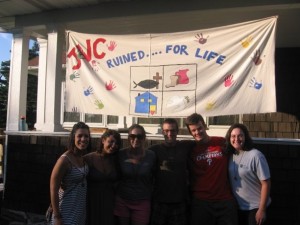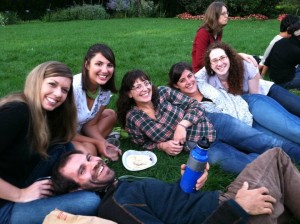It’s easy to get caught up in the doom & gloom outlook on the economy, especially without a job offer in hand. However, there are employment opportunities available across industry lines. Many companies are still hiring and some, like the 22 listed below, in large volumes.
This list was compiled from listings on careerpath.com. According to the site, they are all looking to hire now, so stop by drop-in hours to polish off that resume and cover letter soon!
1. Starbucks
Number of jobs: 13,000 (retail) 400+ (professional services)
Sample job titles: Retail, information technology, supply chain operations and finance
 2. Amazon.com
2. Amazon.com
Number of jobs: 3,000+
Sample job titles: Software development engineers, product managers, operations managers, and communications and product marketing managers
3. The Boeing Company
Number of jobs: More than 500; expects to onboard about 11,000 people
Sample job titles: Engineering, airplane manufacturing, cyber security and intelligence and business functions like finance
4. Citibank
Number of jobs: 2,500
Sample job titles: Customer service, personal banker, home lending specialist, business development officer — commercial banking
5. Adventist Health System
Number of jobs: 2,500+
Sample job titles: Allied health professionals, physical therapists, occupational therapists, speech language pathologists, registered nurses
6. Time Warner Cable
Number of jobs: 500+
Sample job titles: Direct sales reps, customer service reps, technicians and IT and engineering
7. State Farm Insurance
Number of jobs: 2,600
Sample job titles: Actuarial, agency department, banking, claims, creative services, customer service, information technology/systems, legal/litigation, public relations/communications, underwriting
8. Deloitte
Number of jobs: 3,300
Sample job titles: Client service professionals in all business segments including accounting, assurance and advisory, risk, tax, strategy, financial, technology and human capital
9. URS
Number of jobs: 4,300
Sample job titles: Engineering, logistics/supply/procurement, business operations/admin/IT, construction, project/program management, aviation, environmental/sciences, health and safety/homeland security operations and maintenance
10. ADP
Number of jobs: 2,000+
Sample job titles: Sales, implementation, JAVA development, client services, HR
11. T-Mobile USA
Number of jobs: 1,000+
Sample job titles: Retail sales, business sales, corporate and technology
12. Humana Inc.
Number of jobs: 2,200
Sample job titles: Various, including sales, pharmacy, nurses, physicians, service operations, IT
13. Bridgestone Retail Operations
Number of jobs: 1,000+
Sample job titles: Retail sales managers, service managers, automotive technicians, master technicians
14. Universal Health Services
Number of jobs: 1,500+
Sample job titles: Accounting, allied health, education, executives (CEO, CFO, CNO, COO), food and nutritional services, healthcarerehab, ICU, IT, L&D, nursing and office/clerical
15. Koch Industries
Number of jobs: 1,000
Sample job titles: Engineers, IT, operations
16. Black and Veatch
Number of jobs: 500
Sample job titles: Mechanical and electrical engineers, project managers
17. Advanced Technology Services
Number of jobs: 1,000+
Sample job titles: Manufacturing maintenance technicians — field service representatives
18. Burns & McDonnell
Number of jobs: 300
Sample job titles: Civil and environmental engineers, project managers
19. Gentiva Home Health and Hospice
Number of jobs: 1,800+
Sample job titles: Home health and hospice registered nurses, home health and hospice LPNs, nurse management, nurse practitioners, occupational therapists, occupational therapist assistants, single site and multi-site operation management, physical therapists, physical therapist assistants, sales executives
20. USA
Number of jobs: 320+
Sample job titles: Install technicians, customer service, IT tech
21. Certified Payment Processing
Number of jobs: 366
Sample job titles: Sales/account management
22. Bayada Home Health Care
Number of jobs: 300+
Sample job titles: Nursing, assistive care, therapies, medical social work, rehabilitation, hospice, non-clinical support and marketing/sales








